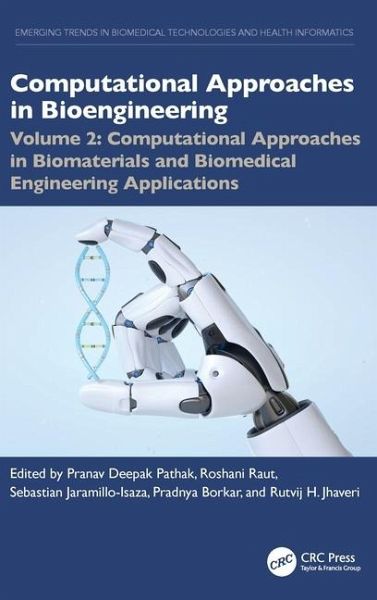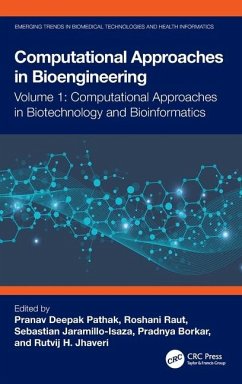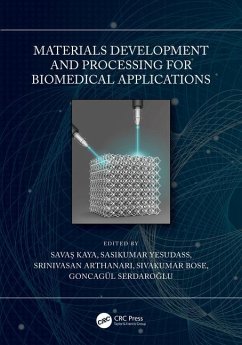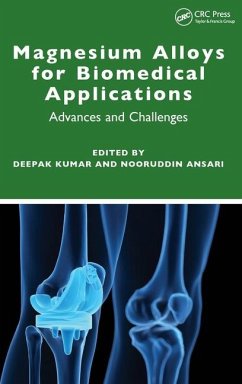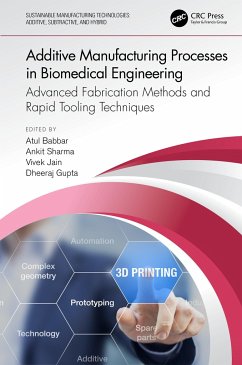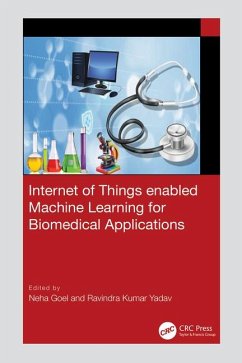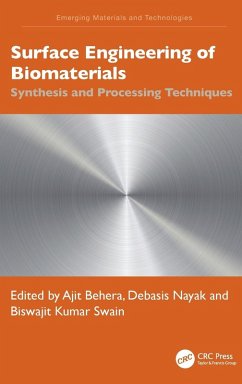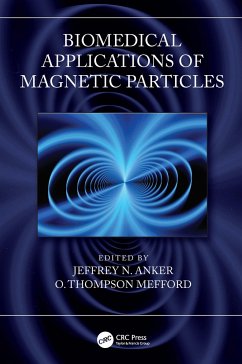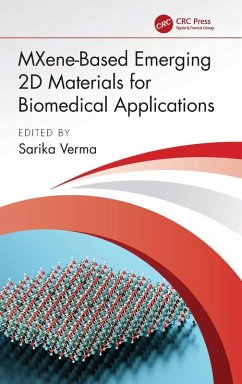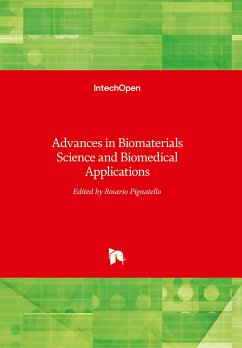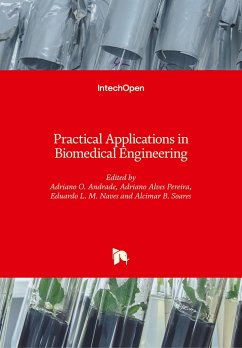Gebundenes Buch
Computational Approaches in Biomaterials and Biomedical Engineering Applications
Versandkostenfrei!
Versandfertig in 1-2 Wochen
Weitere Ausgaben:

PAYBACK Punkte
80 °P sammeln!




This book is a comprehensive, up-to-date resource that provides a broad overview of the use of computational methods in the fields of biomaterials and biomedical engineering, with practical examples and expert insights, it is a valuable resource for those working in these fields.
Dr. Pranav Deepak Pathak is an associate professor at the MIT School of Bioengineering Sciences & Research, Pune, with more than 14 years of teaching experience. He received his undergraduate and postgraduate degrees from Sant Gadge Baba Amravati University, India, and a doctoral degree from Visveswaraya National Institute of Technology, Nagpur, India, in chemical engineering. He has published several papers in peer-reviewed international journals, written book chapters, and edited four books; he has also filed several patents to his credit. He also received grants for several projects. He participated in various national/international conferences, workshops, and training. His research interests include bioengineering, biorefinery, and wastewater treatment. Dr. Roshani Raut obtained her PhD degree in computer science and engineering and ME and BE degrees in computer science and engineering. She has more than 20 years of experience and currently she is working as a professor in the Department of Information Technology and Dean International Relations at Pimpri Chinchwad College of Engineering, Pune, India. She is guiding a PhD research scholar in the University of Technology, Petronas, Malaysia. She is a member of IEEE and ISTE. She has availed research and workshop grants from BCUD, Pune University. She has presented more than 125 research communications in national and international conferences and journals. She has published 15 patents and has received grants for 10 patents. She worked as a convener for national and international conferences. She has published 10 books, where she worked as an author or editor, of various national and international publications like IGI Global, CRC/Taylor & Francis, and Scrivener Wiley. Her research area includes artificial intelligence, machine learning, data mining, and deep learning, among other areas. Sebastián Jaramillo-Isaza is a skilled, rigorous, and highly motivated bioengineer. He holds an MSc in mechanics and materials and a doctoral degree in biomechanics, biomaterials, and bioengineering. In addition, he has substantial experience researching and teaching in motion capture and analysis, biomaterials, rehabilitation, bioinstrumentation, and materials characterization. Furthermore, he has participated in and organized national/international conferences and workshops. Currently, he is working as Associate Professor in Biomedical Engineering at Antonio Nariño University in Bogotá, Colombia. Dr. Pradnya Borkar is Assistant Professor in the Department of Computer Science and Engineering at the Symbiosis Institute of Technology, Nagpur (Constituent of Symbiosis International University, Pune). She earned her BE in computer technology in 2002, her MTech in computer science and engineering in 2008, and her PhD in computer science and engineering in 2018 from Rashtrasant Tukdoji Maharaj Nagpur University (formerly Nagpur University). She has worked with many reputed organizations and has an overall teaching experience of around 19 years. One patent has been granted to her account, and she has filed two more patents. She had handled major responsibilities at the time of accreditation. Her areas of interest are high-performance computing, bioinformatics, parallel computing, database management systems, compilers and theory of computation, etc. She has presented and published many papers in national/international conferences as well as journals. She has published nine book chapters. She is a reviewer of two international journals and has reviewed book chapters for various publishers of repute. She has chaired sessions at international and national conferences. She is a member of professional societies such as the ISTE, CSI, SDIWC, etc. She worked as a committee member in various capacities at the institute and university levels. Dr. Rutvij H. Jhaveri (Senior Member, IEEE) is an experienced educator and researcher working in the Department of Computer Science & Engineering, Pandit Deendayal Energy University, Gandhinagar, India. He conducted his postdoctoral research at Delta-NTU Corporate Lab for Cyber-Physical Systems, Nanyang Technological University, Singapore. He completed his PhD in computer engineering in 2016. In 2017, he was awarded with the prestigious Pedagogical Innovation Award by Gujarat Technological University. Currently, he is co-investigating a funded project from GUJCOST. He was ranked among top 2% scientists around the world in 2022 and 2021. He has 3000+ Google Scholar citations with an H-index of 29. He is an editorial board member of various journals of repute, including IEEE Transactions on Industrial Informatics and Scientific Reports. He also serves as a reviewer in several international journals and as an advisory/TPC member at renowned international conferences. He authored 145+ articles including the IEEE/ACM Transactions and flagship IEEE/ACM conferences. Moreover, he has several national and international patents and copyrights to his name. He also possesses memberships in various technical bodies such as the ACM, CSI, ISTE, and others. He is the coordinator of the SCAN-Smart Cities Air Quality Network. Moreover, he has been a member of the advisory board of the Symbiosis Institute of Digital and Telecom Management and other reputed universities since 2022. He is an editorial board member in several Springer and Hindawi journals. He also served as a committee member in the "Smart Village Project"-Government of Gujarat at the district level during the year 2017. His research interests are Cyber Security, IoT systems, SDN, and smart healthcare.
Produktdetails
- Verlag: CRC Press
- Seitenzahl: 324
- Erscheinungstermin: 27. Mai 2024
- Englisch
- Abmessung: 240mm x 161mm x 22mm
- Gewicht: 652g
- ISBN-13: 9781032635255
- ISBN-10: 1032635258
- Artikelnr.: 70149488
Herstellerkennzeichnung
Libri GmbH
Europaallee 1
36244 Bad Hersfeld
gpsr@libri.de
Für dieses Produkt wurde noch keine Bewertung abgegeben. Wir würden uns sehr freuen, wenn du die erste Bewertung schreibst!
Eine Bewertung schreiben
Eine Bewertung schreiben
Andere Kunden interessierten sich für




